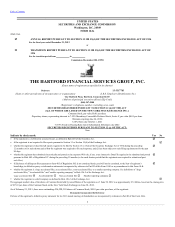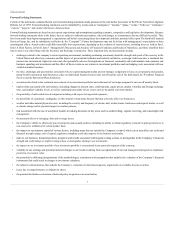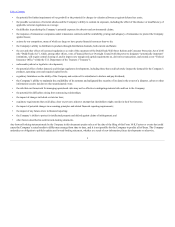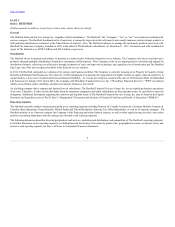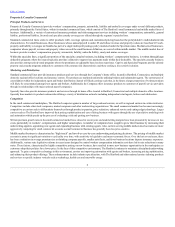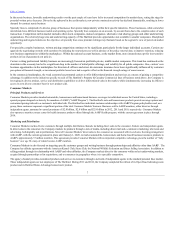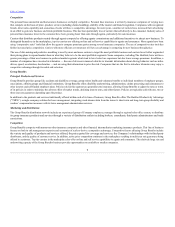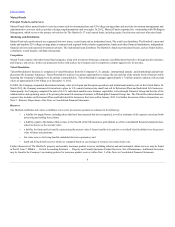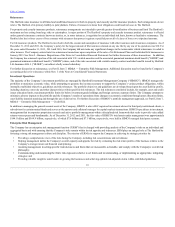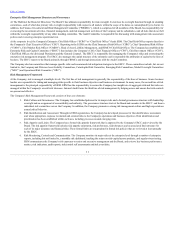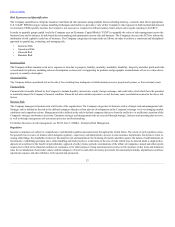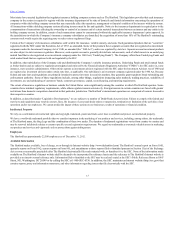The Hartford 2012 Annual Report Download - page 3
Download and view the complete annual report
Please find page 3 of the 2012 The Hartford annual report below. You can navigate through the pages in the report by either clicking on the pages listed below, or by using the keyword search tool below to find specific information within the annual report.
Table of Contents
Certain of the statements contained herein are forward-looking statements made pursuant to the safe harbor provisions of the Private Securities Litigation
Reform Act of 1995. Forward-looking statements can be identified by words such as “anticipates,” “intends,” “plans,” “seeks,” “believes,” “estimates,”
“expects,” “projects,” and similar references to future periods.
Forward-looking statements are based on our current expectations and assumptions regarding economic, competitive and legislative developments. Because
forward-looking statements relate to the future, they are subject to inherent uncertainties, risks and changes in circumstances that are difficult to predict. They
have been made based upon management’s expectations and beliefs concerning future developments and their potential effect upon The Hartford Financial
Services Group, Inc. and its subsidiaries (collectively, the “Company”). Future developments may not be in line with management’s expectations or have
unanticipated effects. Actual results could differ materially from expectations, depending on the evolution of various factors, including those set forth in Part I,
Item 1A. Risk Factors, in Part II, Item 7. Management's Discussion and Analysis of Financial Condition and Results of Operations, and those identified from
time to time in our other filings with the Securities and Exchange Commission. These important risks and uncertainties include:
•challenges related to the company's current operating environment, including continuing uncertainty about the strength and speed of the recovery in the
United States and other key economies and the impact of governmental stimulus and austerity initiatives, sovereign credit concerns, a sustained low
interest rate environment, higher tax rates and other potentially adverse developments on financial, commodity and credit markets and consumer and
business spending and investment and the effect of these events on our returns in investment portfolios and our hedging costs associated with our
variable annuities business;
•the risks, challenges and uncertainties associated with our capital management plan and our strategic realignment to focus on our property and casualty,
group benefits and mutual fund businesses, place our Individual Annuity business into run-off and the sale of the Individual Life, Woodbury Financial
Services and the Retirement Plans businesses;
•execution risk related to the continued reinvestment of our investment portfolios and refinement of our hedge program for our run-off annuity block;
•market risks associated with our business, including changes in interest rates, credit spreads, equity prices, market volatility and foreign exchange
rates, and implied volatility levels, as well as continuing uncertainty in key sectors such as the global real estate market;
•the possibility of unfavorable loss development including with respect to long-tailed exposures;
•the possibility of a pandemic, earthquake, or other natural or man-made disaster that may adversely affect our businesses;
•weather and other natural physical events, including the severity and frequency of storms, hail, winter storms, hurricanes and tropical storms, as well
as climate change and its potential impact on weather patterns;
•risk associated with the use of analytical models in making decisions in key areas such as underwriting, capital, reserving, and catastrophe risk
management;
•the uncertain effects of emerging claim and coverage issues;
•the Company’s ability to effectively price its property and casualty policies, including its ability to obtain regulatory consents to pricing actions or to
non-renewal or withdrawal of certain product lines;
•the impact on our statutory capital of various factors, including many that are outside the Company’s control, which can in turn affect our credit and
financial strength ratings, cost of capital, regulatory compliance and other aspects of our business and results;
•risks to our business, financial position, prospects and results associated with negative rating actions or downgrades in the Company’s financial
strength and credit ratings or negative rating actions or downgrades relating to our investments;
•the impact on our investment portfolio if our investment portfolio is concentrated in any particular segment of the economy;
•volatility in our earnings and potential material changes to our results resulting from our adjustment of our risk management program to emphasize
protection of economic value;
•the potential for differing interpretations of the methodologies, estimations and assumptions that underlie the valuation of the Company’s financial
instruments that could result in changes to investment valuations;
•the subjective determinations that underlie the Company’s evaluation of other-than-temporary impairments on available-for-sale securities;
•losses due to nonperformance or defaults by others;
•the potential for further acceleration of deferred policy acquisition cost amortization;
3

